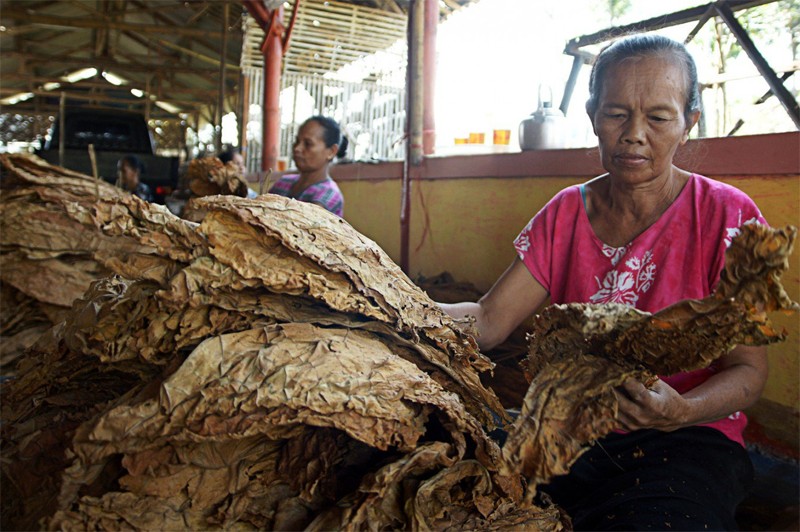Popular Reads
Top Results
Can't find what you're looking for?
View all search resultsPopular Reads
Top Results
Can't find what you're looking for?
View all search resultsFate of tobacco bill continues to hang in balance
The bill, which was included in the 2016 National Legislation Program (Prolegnas) and which seeks to triple cigarette production to 524 billion by 2020, has been met with intense opposition.
Change text size
Gift Premium Articles
to Anyone
A
Cabinet meeting on Tuesday failed to reach an agreement on killing the House of Representatives’ initiative to deliberate a controversial tobacco bill, with President Joko “Jokowi” Widodo instructing his ministers to find a solution that would be good for the industry and mitigate health problems caused by smoking.
President Jokowi has until March 18 to make his stance public regarding the House’s tobacco bill, which health campaigners have strongly rejected.
On Monday Coordinating Political, Legal and Security Affairs Minister Wiranto claimed that relevant ministries already shared “a common understanding about the bill” and a final decision would be made during Tuesday’s Cabinet meeting.
(Read also: Indonesia's chief security minister to decide tobacco bill's fate)
On Tuesday, ministers taking part the limited Cabinet meeting failed to present a unified approach toward the bill with Health Minister Nila Moeloek expressing her strongest opposition to the bill.
In his opening remarks, Jokowi said he could understand the health concerns raised by the Health Ministry but the welfare of those who worked in the tobacco industry should also be taken into consideration.
“I want to remind you all about what I said in the Cabinet meeting in June 2016, that the tobacco issue must be seen from two standpoints,” Jokowi said, referring to health concerns and the welfare of tobacco farmers.
The bill, which was included in the 2016 National Legislation Program (Prolegnas) and which seeks to triple cigarette production to 524 billion by 2020, has been met with intense opposition. The Health Ministry, which represents the government in the discussion of the bill with the House, had rejected the inclusion of the bill. The return of senior Golkar Party politician Setya Novanto as House speaker in November last year paved the way for the inclusion of the bill in the 2017 Prolegnas.
(Read also: Cigarette production up in spite of lesser firms, workers)
Despite his concern for the welfare of workers who rely on the tobacco industry, Jokowi said he was aware of tobacco’s damaging effects, especially among members of poor households who spend more money on cigarettes than other basic needs.
“The money spent on tobacco products is 3.2 times more than the amount spent on eggs and milk, 4.2 times higher than spending on meat, 4.4 times higher than spending on education and 3.3 times higher than health spending. This tells us that it will affect the quality of our future generations,” Jokowi told the Cabinet meeting.
The President also cited data from the Health Care and Social Security Agency (BPJS) that more than 50 percent of spending on medication was to cure conditions caused by tobacco consumption and exposure to secondhand smoke.
With regard to the industry, Jokowi has instructed the Agriculture Ministry and the Manpower Ministry to study what measures could be taken to protect workers in the tobacco industry.
The bill itself seeks to boost tobacco production with a stipulation that would require tobacco companies to use 80 percent local tobacco in their products.
Health Minister Nila insisted that officials from the ministry would not join the deliberation of the bill with the House.
“We have to take care of the health of the people,” she said.
World Health Organization Indonesia officer for the Tobacco Free initiative Dina Kania said it was impossible for Jokowi to accommodate both the interests of antitobacco groups and the tobacco industry in the bill.
Dina said Jokowi must make up his mind about protecting the public from the danger of tobacco use.
“If the bill is finally approved it will also kill all prevailing regulations on tobacco control because within two years after its deliberation all regulations on tobacco control must comply with it. President Jokowi must stand for public health in his decision,” Dina said.










